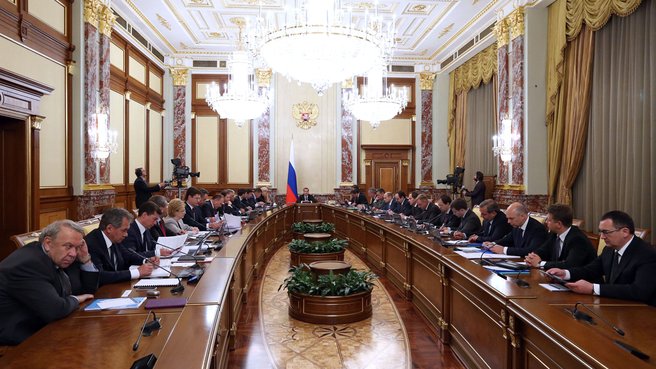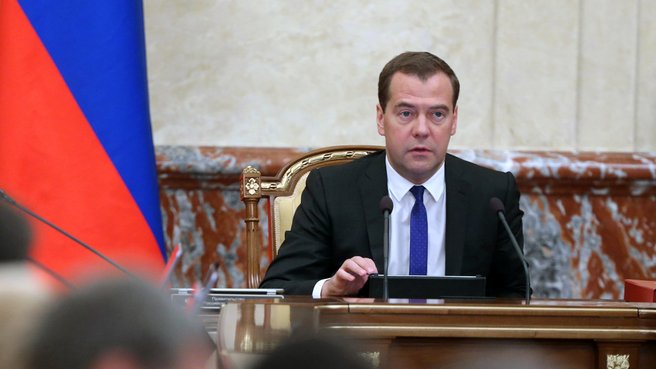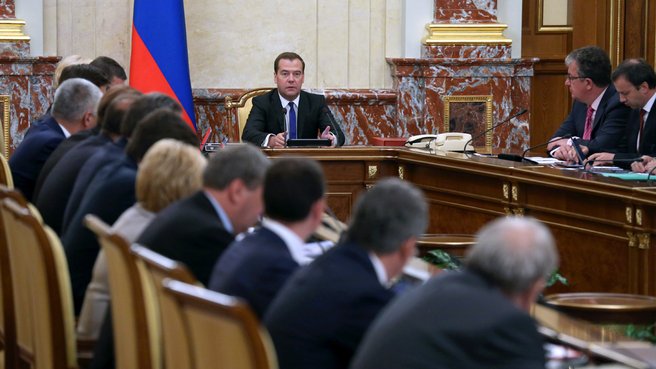Dmitry Medvedev’s introductory remarks:
Good afternoon, colleagues. A great event happened earlier today: We signed the Treaty on the Establishment of the Eurasian Economic Union, which is certain to define our course of development for years to come.
<…>
We will continue to work on the draft federal budget. Today we will consider tax policy guidelines for the coming period. This document, although it is not a regulatory act, has been drafted by the Expert Council, deputies and the business community. And it contains leads for all businesses and, of course, for residents with regard to what steps the Government is planning in the fiscal sphere.
It is understood that these steps should increase budget revenues, while stimulating investment activity. They are also due to adjust disproportions in the development of certain regions and industries, encourage replacement of fixed assets, and help to launch new industrial businesses.
The overall tax burden on the economy is generally in line with the average OECD indicators. Last year, this burden amounted to about one-third of the GDP, and we proceed from the assumption that it will not grow in the mid-term. But this country is distinct in that its oil and gas industry’s contributions are relatively higher than what comes from other sectors. The Ministry of Finance estimates that the tax on the extraction of commercial minerals and the export duties on hydrocarbons account for one-third of the entire burden. This leaves an imprint on how taxes are shaped in this country. But certainly the important thing for businesses is not only the level of taxes but also an improvement in tax collection administration.
I approved a relevant roadmap in February of this year. It contains certain objectives which we must achieve. It is important to guarantee the rights of all bona fide taxpayers, while putting a barrier in the path of all those who resort to dubious or illegal schemes.
Finally, the tax policy tools are important for the balanced development of the Russian regions. On 21 May, I held a telephone conference with governors. There are questions on how certain existing tax items work. Specifically, it has been suggested that the mechanism of consolidated taxpayer groups should be improved and that we should more accurately predict how much revenue will come to regional and local budgets. This work must be continued in line with the instructions that were handed down at the meeting. The same goes for working with the regions.
With regard to the Russian Far East, it has been decided to provide new enterprises with some rather significant tax preferences, just like those for emerging territories with faster than planned development. Similar mechanisms are being assessed for Crimea. We hope that this will make it possible to attract investment here, in any case.
Dmitry Medvedev: "With regard to the Russian Far East, it has been decided to provide new enterprises with some rather significant tax preferences, just like those for emerging territories with faster than planned development. Similar mechanisms are being assessed for Crimea. We hope that this will make it possible to attract investment here, in any case."
We will also review the draft priorities of the 2015-2017 customs and tariffs policy that stipulates basic conditions of foreign economic activity over this period. On the whole, this is an important component of the country’s well-balanced economic and social development.
In the next few years, we will have to work against the backdrop of persisting instability and a deteriorating situation on certain markets. Some new risks, linked with trade regime changes for certain CIS countries, are likely to emerge. This may be the case with Ukraine and Moldova. There is also the issue of sanctions against a number of Russian companies. All this may negatively affect trade volumes. But, on the other hand, we should work within the format of the existing Customs Union and the emerging Eurasian Economic Union.
I would also like to bring up the following issue. These two draft laws which have been compiled in line with several Presidential and Government instructions are called upon to make special economic zones more effective. What do these documents stipulate? First, they allow the simultaneous introduction of various types of activity at special economic zones, including activities related to technology and innovation; industry and production; and tourism and recreation. There are also plans to subdivide special economic zones into two categories – federal and regional – and to stipulate a special procedure for establishing these zones, various regulations governing their operation, as well as differing amounts of preferences for them. Simplified customs procedures are envisioned for federal economic zones. I hope that this will expedite customs clearance procedures for various goods and products and make it possible to reduce budget funding volumes for their infrastructure construction projects. Such concepts as technology, agro-industrial, tourist and industrial parks, which are, in fact, different forms of special regional economic zones, are being legally formalised. In effect, new concepts are being introduced. Regional agencies will have the authority to establish and manage these zones. Plans have been made to provide state support for special regional economic zones, including the creation of their infrastructure in line with the Tax Increment Financing (TIF) mechanism, which we have repeatedly discussed, including participants in the latest meeting in Kaliningrad. Hopefully, this will provide a new impetus for the development of regional economic zones.
<…>













